News and Site Updates Archive 2009/03/15
Never let a serious crisis go to waste.
What I mean by that is it's an opportunity to do things you couldn't do before.
- Rahm Emanuel
  15
Mar '09 - In a 12-acre lake on the Pacific island of Palau live
10 million jellyfish. They thrive because the lake is rich in algae
and there are no predators - causing them over time to have lost their stings.
Tourists with permits can now swim or snorkel among the 6-to-9-inch creatures;
there are so many that it feels like swimming "in jellyfish soup"... We
could be living within a "hidden sector",
an unseen aspect of the cosmos that may exist all around us (which may even
include new forces of nature). Such strange hidden worlds emerge naturally
from complex theories such as string theory (which attempts to mesh together the
very small and the very large). Hidden worlds may, literally, be
everywhere, populated by a rich menagerie of particles that have their own
forces - yet we could be unaware of their existence because their particles
interact so weakly with the familiar matter of our own universe. Of late,
physicists have taken seriously the idea that particles from such hidden sectors
could be dark matter, about which we know precious little except that its
gravity is what keeps the universe we know from flying apart. 15
Mar '09 - In a 12-acre lake on the Pacific island of Palau live
10 million jellyfish. They thrive because the lake is rich in algae
and there are no predators - causing them over time to have lost their stings.
Tourists with permits can now swim or snorkel among the 6-to-9-inch creatures;
there are so many that it feels like swimming "in jellyfish soup"... We
could be living within a "hidden sector",
an unseen aspect of the cosmos that may exist all around us (which may even
include new forces of nature). Such strange hidden worlds emerge naturally
from complex theories such as string theory (which attempts to mesh together the
very small and the very large). Hidden worlds may, literally, be
everywhere, populated by a rich menagerie of particles that have their own
forces - yet we could be unaware of their existence because their particles
interact so weakly with the familiar matter of our own universe. Of late,
physicists have taken seriously the idea that particles from such hidden sectors
could be dark matter, about which we know precious little except that its
gravity is what keeps the universe we know from flying apart.
 Had someone succeeded
in killing
Queen Victoria before she gave birth, maybe the British monarchy wouldn't've
survived. None of her grandfather George III's dissolute sons produced a
robust heir; her uncle George IV's daughter, Princess Charlotte, died at 21 in
childbirth. King William IV, the uncle who inherited the throne, had 10
children by actress Mrs Jordan - unfortunately, though they were a vigourous
brood who went on to breed many an interesting descendant (David Cameron,
current Opposition Leader, is one), none was legitimate. Victoria's father
died early on, so there was paranoia in court circles that she - and therefore
the monarchy - might be lost. Her childhood was under constant supervision
- even at 18 she had to hold someone's hand going up or down stairs; her food
was tasted for poison; she shared a bedroom with her mother until she became
queen. Luckily, she met her 1st cousin, Albert, with whom she had 9
children and from whom descended the royal families of Prussia (later Germany),
Russia, Spain, Denmark, Greece and Sweden - despite the fact she was possibly
illegitimate. Many suspected that Irishman Sir John Conroy, Comptroller of
her mother's household, was her father - though chubby Victoria bore no
resemblance to him. Around Albert, too, were rumours of illegitimacy due
to his parents' divorce. (Maybe it goes with the job.) Their eldest
child, Crown Princess Vicky, was mother of German Emperor Kaiser Wilhelm II,
whose militarist policies led to the outbreak of World War I. Albert had
had a vision of a modern federalist Germany based on democracy - but, before
seeing his plans carried out, he died of typhoid at 42.
As time went by, Victoria increasingly relied on her Scottish manservant,
John Brown. When she died, two sets of mementos were placed in her coffin
at her request: by her side was one of Albert's dressing gowns. In her
left hand was a lock of Brown's hair and his photo. (Curiously, she also
wore Brown's mother's wedding ring.) I presume the idea of a monarchy is
theoretically based (at least in part) on having a family dynasty which evidencs
better-than-average leadership genes, useful in heading a country. Since
children inherit basic personality from the father (and basic IQ from mother),
possibly King William IV's eldest son would've been a more logical leadership
choice than Victoria. Had someone succeeded
in killing
Queen Victoria before she gave birth, maybe the British monarchy wouldn't've
survived. None of her grandfather George III's dissolute sons produced a
robust heir; her uncle George IV's daughter, Princess Charlotte, died at 21 in
childbirth. King William IV, the uncle who inherited the throne, had 10
children by actress Mrs Jordan - unfortunately, though they were a vigourous
brood who went on to breed many an interesting descendant (David Cameron,
current Opposition Leader, is one), none was legitimate. Victoria's father
died early on, so there was paranoia in court circles that she - and therefore
the monarchy - might be lost. Her childhood was under constant supervision
- even at 18 she had to hold someone's hand going up or down stairs; her food
was tasted for poison; she shared a bedroom with her mother until she became
queen. Luckily, she met her 1st cousin, Albert, with whom she had 9
children and from whom descended the royal families of Prussia (later Germany),
Russia, Spain, Denmark, Greece and Sweden - despite the fact she was possibly
illegitimate. Many suspected that Irishman Sir John Conroy, Comptroller of
her mother's household, was her father - though chubby Victoria bore no
resemblance to him. Around Albert, too, were rumours of illegitimacy due
to his parents' divorce. (Maybe it goes with the job.) Their eldest
child, Crown Princess Vicky, was mother of German Emperor Kaiser Wilhelm II,
whose militarist policies led to the outbreak of World War I. Albert had
had a vision of a modern federalist Germany based on democracy - but, before
seeing his plans carried out, he died of typhoid at 42.
As time went by, Victoria increasingly relied on her Scottish manservant,
John Brown. When she died, two sets of mementos were placed in her coffin
at her request: by her side was one of Albert's dressing gowns. In her
left hand was a lock of Brown's hair and his photo. (Curiously, she also
wore Brown's mother's wedding ring.) I presume the idea of a monarchy is
theoretically based (at least in part) on having a family dynasty which evidencs
better-than-average leadership genes, useful in heading a country. Since
children inherit basic personality from the father (and basic IQ from mother),
possibly King William IV's eldest son would've been a more logical leadership
choice than Victoria.
  Going from logical leadership
choices to to illogical leadership choices: Okay - I admit it. This is my
favourite photo of Sarah Palin. Sorry, I don't know the source... I
found the photo on the right of
Venezuelan President Hugo Chavez oddly disturbing. For one thing, I
thought the hanging object was a baby on first glance. But even as a
crucifix it's a bit strange. Let's make it look as real as possible, then
feel it? What thoughts are running through his mind?...
Can the right drug make you a better person? Would you, yourself, take
a kindness pill? Would you want your country's leaders to take them?... After our
distant ancestors developed language, everyone could benefit from the
experiences of others. But the bandwidth of speech is low compared to
one's own senses. Huge compression and decompression at each end of the
communication is required. The process of describing and interpreting is
enabled by detailed world models everyone carries in their heads. Because
these models vary from person to person, the codec is lossy; misunderstandings
are inevitable. But imprecision also makes words more timeless and
intimate. If the impressions some words convey resonate with you, it's
because they are literally built out of the way you view the world. Words
can also lie - but along with interpreting words, we automatically assess the
trustworthiness of their source. You can go to this article to read the
rest of it if you like, but I don't recommend it - I thought it degenerated into
a believer's discussion of religious fundamentalism that I found unimpressive -
though these first 2 paragraphs had some merit. I also found amusing the
up-front comment that this blogger "is not unacquainted with the grape". Going from logical leadership
choices to to illogical leadership choices: Okay - I admit it. This is my
favourite photo of Sarah Palin. Sorry, I don't know the source... I
found the photo on the right of
Venezuelan President Hugo Chavez oddly disturbing. For one thing, I
thought the hanging object was a baby on first glance. But even as a
crucifix it's a bit strange. Let's make it look as real as possible, then
feel it? What thoughts are running through his mind?...
Can the right drug make you a better person? Would you, yourself, take
a kindness pill? Would you want your country's leaders to take them?... After our
distant ancestors developed language, everyone could benefit from the
experiences of others. But the bandwidth of speech is low compared to
one's own senses. Huge compression and decompression at each end of the
communication is required. The process of describing and interpreting is
enabled by detailed world models everyone carries in their heads. Because
these models vary from person to person, the codec is lossy; misunderstandings
are inevitable. But imprecision also makes words more timeless and
intimate. If the impressions some words convey resonate with you, it's
because they are literally built out of the way you view the world. Words
can also lie - but along with interpreting words, we automatically assess the
trustworthiness of their source. You can go to this article to read the
rest of it if you like, but I don't recommend it - I thought it degenerated into
a believer's discussion of religious fundamentalism that I found unimpressive -
though these first 2 paragraphs had some merit. I also found amusing the
up-front comment that this blogger "is not unacquainted with the grape".
 Having
children vaccinated against chicken pox has an unexpected effect - it raises
the rate of shingles among the elderly. According to one US study, shingle
cases have risen by 90%. How can a vaccine for children make old people
ill? Because chicken pox and shingles are caused by the varicella virus;
after a childhood attack of chicken pox, the virus lies dormant in the nerves
until triggered in later life when it flares up as shingles. When adults
come into contact with children who've just caught chicken pox, they get the
natural equivalent of a booster shot of the virus which strengthens their
resistance. In the past, when children got chicken pox, mothers would
invite neighbour children to a "chicken pox party" so they, too, could become
infected and get it over with. But parents benefited as well. A
nationwide campaign to vaccinate children against the disease means adults are
then exposed to fewer children with chicken pox so they miss out on this natural
booster. By the age of 85, 65% of the elderly will suffer this often
extremely painful disease. One wonders why adults can't just receive a
booster shot themselves... People's
reaction times are a far better indicator of their chance of living a long
life than their blood pressure, exercise levels or weight, researchers have
discovered. Men and women with the most sluggish response times are more
than twice as likely to die prematurely. The thing that surprised me most
is that researchers suggest that people’s reaction times are a measure of their
intelligence, which in turn is an indicator of their body’s "system integrity" –
how well it is wired together. There is growing evidence that people with
higher IQs tend to live longer and healthier lives. Having
children vaccinated against chicken pox has an unexpected effect - it raises
the rate of shingles among the elderly. According to one US study, shingle
cases have risen by 90%. How can a vaccine for children make old people
ill? Because chicken pox and shingles are caused by the varicella virus;
after a childhood attack of chicken pox, the virus lies dormant in the nerves
until triggered in later life when it flares up as shingles. When adults
come into contact with children who've just caught chicken pox, they get the
natural equivalent of a booster shot of the virus which strengthens their
resistance. In the past, when children got chicken pox, mothers would
invite neighbour children to a "chicken pox party" so they, too, could become
infected and get it over with. But parents benefited as well. A
nationwide campaign to vaccinate children against the disease means adults are
then exposed to fewer children with chicken pox so they miss out on this natural
booster. By the age of 85, 65% of the elderly will suffer this often
extremely painful disease. One wonders why adults can't just receive a
booster shot themselves... People's
reaction times are a far better indicator of their chance of living a long
life than their blood pressure, exercise levels or weight, researchers have
discovered. Men and women with the most sluggish response times are more
than twice as likely to die prematurely. The thing that surprised me most
is that researchers suggest that people’s reaction times are a measure of their
intelligence, which in turn is an indicator of their body’s "system integrity" –
how well it is wired together. There is growing evidence that people with
higher IQs tend to live longer and healthier lives.
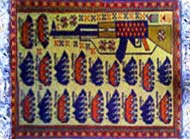  I found this rug for
sale on the
New York City Craigslist
site. It was described as a "true Persian carpet". It took me a bit
to realise exactly what the rug was depicting. I presume its source is
Iran?... In 1980,
a sudden explosion in a Titan missile base near Little Rock, Arkansas popped
the top off a silo like a cheap champagne cork and tossed the missile’s
9-megaton warhead straight up. Landing some 1,000 feet away, it was later
found to be pretty much intact. After reading about all the near-misses of
nuclear accidents through the years, it borders on the miraculous that there
hasn't been an accidental detonation before now. Let's hope our luck
holds... A research team has found biological evidence that
musical training enhances ability to recognise and respond to emotion in sound.
Brainstem processing of pitch, timing, and timbre was measured in both musicians
and non-musicians listening to a fragment of a baby's cry. Sensitivity to
the sound (in particular the complicated part contributing most to emotional
content) was measured through scalp electrodes. Musicians’ brainstems
locked onto the complex part of sound known to carry more emotional elements but
de-emphasised the simpler (less emotion conveying) part. This was not the
case for non-musicians. Those participants who had years of musical
experience or who had studied music theory were better able to process emotional
content. Acoustic elements that musicians process more efficiently are the
same ones that children with language disorders, such as dyslexia and autism,
have problems encoding. I found this rug for
sale on the
New York City Craigslist
site. It was described as a "true Persian carpet". It took me a bit
to realise exactly what the rug was depicting. I presume its source is
Iran?... In 1980,
a sudden explosion in a Titan missile base near Little Rock, Arkansas popped
the top off a silo like a cheap champagne cork and tossed the missile’s
9-megaton warhead straight up. Landing some 1,000 feet away, it was later
found to be pretty much intact. After reading about all the near-misses of
nuclear accidents through the years, it borders on the miraculous that there
hasn't been an accidental detonation before now. Let's hope our luck
holds... A research team has found biological evidence that
musical training enhances ability to recognise and respond to emotion in sound.
Brainstem processing of pitch, timing, and timbre was measured in both musicians
and non-musicians listening to a fragment of a baby's cry. Sensitivity to
the sound (in particular the complicated part contributing most to emotional
content) was measured through scalp electrodes. Musicians’ brainstems
locked onto the complex part of sound known to carry more emotional elements but
de-emphasised the simpler (less emotion conveying) part. This was not the
case for non-musicians. Those participants who had years of musical
experience or who had studied music theory were better able to process emotional
content. Acoustic elements that musicians process more efficiently are the
same ones that children with language disorders, such as dyslexia and autism,
have problems encoding.
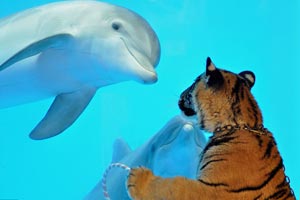 |
 |
 |
|
A dolphin and a tiger would never meet in the wild
- and seldom would a dolphin meet a dog (about as often a whale meets
humans?). Six Flags Discovery Kingdom staff were taking a 6-month-old
tiger cub on her daily walk when the animals spotted each other and decided
to have a closer look. From their earliest days,
we teach our children about wild things. Even as more of them grow
up in cities or suburbs, seemingly isolated from anything truly wild, we
tell stories and read books about elephants, bears, monkeys and tigers.
Many of the best children's books are about wild things, most
anthropomorphised and friendly. To parents reading these stories, this
obsession with the wild might seem silly - but to a kid this is an
introduction to the world's amazing capacity for strangeness and beauty.
We take our kids zoos - ignoring the unnerving vacant glaze in the eyes of
penned polar bears - because we know nothing is quite so magical to them as
seeing fiction become suddenly real. In time, of course, children come
to see zoos for what they are: places where nothing is real, where wild
animals can't be wild, where every instinct is curbed by confinement or
scheduled feedings. We think we're teaching our kids about wildness
but really we teach them about dominion - a lesson in the power of
enclosures. |
  How
to make a rainbow cake. To the right is the sofa used in that site's
logo - one of the most beautiful couches I've seen. I want it (via
Colourlovers)...
Sarah and Tom were childhood sweethearts who met at school. After
graduation they moved in together, marrying in their mid-20s. They tried
for a baby but after 6 months without success, they went to be medically
checked. Sarah says: "My results were okay but when Tom's results came
back the doctor said there had to be a mistake, some mix-up in the lab.
Yet the same result came back the 2nd time: Tom's sperm count was zero (a
condition called azoospermia). Doctors said he was born that way."
The couple decided to use a sperm donor and after 5 gruelling rounds of
fertility treatment, Sarah fell pregnant. She gave birth to a daughter.
Three months later, however, Tom calmly informed his wife that the child did not
feel like his daughter. He hadn't bonded with her and as far as he was
concerned he wasn't her father. And that was that. Tom left his wife
and baby and never returned. His parting shot, Sarah recalls, was that she
had made him "feel less than a man." Personally, I suspect that, whether
they leave the family or not, many men who are fathers of babies conceived with
another man's sperm feel similarly. A father, unlike a
mother, cannot always be sure a baby is his. If he spots a
resemblance, he will know the child is his and be more likely to protect and
care for it, benefiting both mother and baby. This resemblance is most
pronounced immediately after birth, fading over the next couple of years.
Therefore, men have evolved to bond with babies that have more of their facial
characteristics; infants have evolved to generally resemble dad, at least at
birth. This can be problematic in the event of infertility and subsequent
sperm donations. How
to make a rainbow cake. To the right is the sofa used in that site's
logo - one of the most beautiful couches I've seen. I want it (via
Colourlovers)...
Sarah and Tom were childhood sweethearts who met at school. After
graduation they moved in together, marrying in their mid-20s. They tried
for a baby but after 6 months without success, they went to be medically
checked. Sarah says: "My results were okay but when Tom's results came
back the doctor said there had to be a mistake, some mix-up in the lab.
Yet the same result came back the 2nd time: Tom's sperm count was zero (a
condition called azoospermia). Doctors said he was born that way."
The couple decided to use a sperm donor and after 5 gruelling rounds of
fertility treatment, Sarah fell pregnant. She gave birth to a daughter.
Three months later, however, Tom calmly informed his wife that the child did not
feel like his daughter. He hadn't bonded with her and as far as he was
concerned he wasn't her father. And that was that. Tom left his wife
and baby and never returned. His parting shot, Sarah recalls, was that she
had made him "feel less than a man." Personally, I suspect that, whether
they leave the family or not, many men who are fathers of babies conceived with
another man's sperm feel similarly. A father, unlike a
mother, cannot always be sure a baby is his. If he spots a
resemblance, he will know the child is his and be more likely to protect and
care for it, benefiting both mother and baby. This resemblance is most
pronounced immediately after birth, fading over the next couple of years.
Therefore, men have evolved to bond with babies that have more of their facial
characteristics; infants have evolved to generally resemble dad, at least at
birth. This can be problematic in the event of infertility and subsequent
sperm donations.
 Many
people talk at their dogs endlessly, which encourages the dog to just tune them
out. Instead of chattering on in a constant, meaningless way to your
dog (or your husband), keep in mind that the words you use to communicate are
important. Say less. Pay attention to the words and the tone you
use. Words should create meaning in your dog’s (or your husband's) life,
not add to his confusion...
The Potsdam Giants was a Prussian infantry regiment composed of
taller-than-average soldiers. Its founder was the Prussian king Friedrich
Wilhelm I of Prussia (1688 - 1740). The unit was known as the "Potsdamer
Riesengarde" (Giant Guard of Potsdam), but the Prussian population quickly
nicknamed them the "Lange Kerls" ("Long Guys"). The original required
height was 1.8 metres (5 feet 11 inches), then well above average. The
tallest soldiers were reportedly 2.17 metres (about 7 feet). The king
himself was only 1.5 metres (4 feet 11 inches) tall. He once confided to
the French ambassador, "The most beautiful woman in the world would be a matter
of indifference to me, but tall soldiers - they are my weakness." He gave
bonuses to fathers of tall sons and to landowners who gave up their tallest farm
workers to join the regiment. His agents kidnapped tall men from all over
Europe. He even forced tall women to marry tall soldiers so they could
breed more tall boys - but the king's idea to stretch his troopers to make them
even taller was finally met with open rebellion. Many
people talk at their dogs endlessly, which encourages the dog to just tune them
out. Instead of chattering on in a constant, meaningless way to your
dog (or your husband), keep in mind that the words you use to communicate are
important. Say less. Pay attention to the words and the tone you
use. Words should create meaning in your dog’s (or your husband's) life,
not add to his confusion...
The Potsdam Giants was a Prussian infantry regiment composed of
taller-than-average soldiers. Its founder was the Prussian king Friedrich
Wilhelm I of Prussia (1688 - 1740). The unit was known as the "Potsdamer
Riesengarde" (Giant Guard of Potsdam), but the Prussian population quickly
nicknamed them the "Lange Kerls" ("Long Guys"). The original required
height was 1.8 metres (5 feet 11 inches), then well above average. The
tallest soldiers were reportedly 2.17 metres (about 7 feet). The king
himself was only 1.5 metres (4 feet 11 inches) tall. He once confided to
the French ambassador, "The most beautiful woman in the world would be a matter
of indifference to me, but tall soldiers - they are my weakness." He gave
bonuses to fathers of tall sons and to landowners who gave up their tallest farm
workers to join the regiment. His agents kidnapped tall men from all over
Europe. He even forced tall women to marry tall soldiers so they could
breed more tall boys - but the king's idea to stretch his troopers to make them
even taller was finally met with open rebellion.
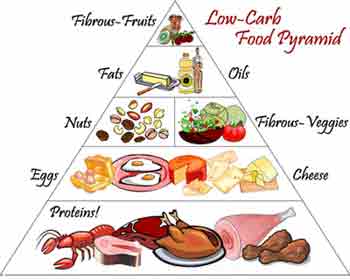
|
Women store fat more efficiently than men, despite
eating proportionally fewer calories. The reason is because œstrogen
encourages their bodies to store up fat for fertility, fœtal development and
lactation by reducing postprandial fatty acid oxidation. So,
is one diet as good as another? Not if you want to lose fat
instead of muscle, keep the weight off long-term, and even lower your
triglyceride levels so you'll be less likely to develop diabetes and heart
disease. The latest studies shows that women (and men) have a better
chance of achieving all those goals if they follow a diet moderately high in
protein and fat and lower in carbohydrates. If you lose muscle, and
you used to be able to consume 2,000 calories without gaining weight, you'll
find that now you can only eat, say, 1,800 calories without weight gain.
Further,
a low-carb diet may even reduce epileptic seizures. A low-carb,
high-fat diet causes ketosis - where the body burns fat instead of sugar.
It seems ketone fats, the waste products left after the fat is burned, build
up and inhibit seizures, although exactly how is unknown. |
 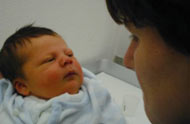 Illness, lost productivity and other consequences
of fouled water and inadequate sewage treatment trim up to 7% from the gross
domestic product of Cambodia, Indonesia, the Philippines and Vietnam each year.
Worldwide, 18% of the population, or 1.2 billion people, rely on open defecation,
including some 665 million Indians (more than ½ of all households). In
India, 100,000 tons of human excrement is deposited each day in fields of
potatoes, carrots and spinach; on banks that line rivers used for drinking and
bathing; and along roads jammed with scooters, trucks and pedestrians.
Each gram of fæces can contain 10 million virus particles, 1 million bacteria,
1,000 parasite cysts and 100 parasite eggs; 75% of the country’s surface water
is contaminated by human and agricultural waste and industrial effluent.
In a country where annual per-capita income is less than US$500, half the
schools don’t have separate toilet facilities for males and females; many girls
drop out upon reaching puberty, severely curtailing chances of future financial
improvement. This is in a country which has successfully landed a probe on
the moon... Geographical mobility means that
women today often live far away from family, with no relatives living nearby.
Also most births take place in a hospital so that few women have been present at
childbirth before they have their own child. While they are better
informed about sex than in the past, they are left feeling "ignorant and
ill-equipped" to cope with pregnancy, childbirth and infant care. Many
feel motherhood is not instinctive. Perhaps the carer they've engaged so
they can get back to work will be able to do a better job? Good luck with
that. Illness, lost productivity and other consequences
of fouled water and inadequate sewage treatment trim up to 7% from the gross
domestic product of Cambodia, Indonesia, the Philippines and Vietnam each year.
Worldwide, 18% of the population, or 1.2 billion people, rely on open defecation,
including some 665 million Indians (more than ½ of all households). In
India, 100,000 tons of human excrement is deposited each day in fields of
potatoes, carrots and spinach; on banks that line rivers used for drinking and
bathing; and along roads jammed with scooters, trucks and pedestrians.
Each gram of fæces can contain 10 million virus particles, 1 million bacteria,
1,000 parasite cysts and 100 parasite eggs; 75% of the country’s surface water
is contaminated by human and agricultural waste and industrial effluent.
In a country where annual per-capita income is less than US$500, half the
schools don’t have separate toilet facilities for males and females; many girls
drop out upon reaching puberty, severely curtailing chances of future financial
improvement. This is in a country which has successfully landed a probe on
the moon... Geographical mobility means that
women today often live far away from family, with no relatives living nearby.
Also most births take place in a hospital so that few women have been present at
childbirth before they have their own child. While they are better
informed about sex than in the past, they are left feeling "ignorant and
ill-equipped" to cope with pregnancy, childbirth and infant care. Many
feel motherhood is not instinctive. Perhaps the carer they've engaged so
they can get back to work will be able to do a better job? Good luck with
that.
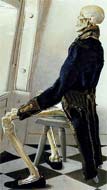 Dr
Syn was painted by Andrew Wyeth in 1981.
Wyeth comes from an illustrious family: son of artist N C Wyeth, brother to
inventor Nathaniel Wyeth, sister to painter Henriette Wyeth Hurd, and father to
artists Jamie and Nicholas... Turks live under a secular law derived from
the legal systems of post-Napoleonic Europe; they are seldom disposed to think
that as Muslims they must live in
a state of continual submission to a divine law that governs all social and
political life. The 20% of Muslims who are Arabs, however, feel the
mesmerising rhythms of the Koran as an unbrookable current of compulsion and are
apt to take "Islam" (submission) literally. For them, this may mean
renouncing not only freedom but also the very idea of citizenship, retreating
from open dialogue on which secular order depends into the "shade of the Koran."
Citizenship, by contrast, is precisely not a brotherhood that follows from
shared acts of heartfelt submission: it is a relation among strangers, leaving
fulfillment and meaning to the private sphere. Though a great achievement
of Western civilisation, citizenship is not sufficient by itself to create a
stable society. It needs associated meanings to which rising generations
can attach hopes and a search for identity. Happiness comes not from
pursuit of pleasure, but from sacrifice. What sacrifices (other than
financial) do citizens make today? (Sending their sons off to fight
perennial wars in the Middle East?) But some Muslims may make too many
sacrifices to achieve happiness.
For example, a 75-year-old widow in Saudi Arabia has been sentenced to 40
lashes and 4 months in jail for "mingling" with 2 young men who are not close
relatives. The widow is Syrian but had married a Saudi. The verdict
demands she be deported after her sentence is carried out. The woman had
asked the 24-year-old nephew of her late husband to bring her loaves of bread,
which he did; one of his friends came along. The men and the woman were
arrested by religious police after delivery of the bread; the men also were
convicted and sentenced to lashes and prison. Saudi Arabia's strict
interpretation of Islam prohibits men and women who are not immediate relatives
from mingling. The widow told the court she considers her nephew as a son
because she breast-fed him when he was a baby. But the court denied her
claim, saying she didn't provide evidence.
Commenting on the case, a lawyer said if it is proved that she is the
nephew's foster mother through breast-feeding, then the charge of khulwa
(illegal seclusion) will be nullified. But if his relation to her is only
as his uncle’s wife then the charge will stand as she is eligible to marry him
(she's 75 and he's 24 remember). The lawyer said a 75-year-old woman is
usually not considered seductive yet she is a woman and unrelated men should not
remain alone with her. Court rulings in such cases are based on Shariah,
which does not differentiate between old and young. "Old age is not a
sufficient ground for acquittal," he said. This incident has drawn new
criticism for the kingdom's ultraconservative religious police and judiciary. Dr
Syn was painted by Andrew Wyeth in 1981.
Wyeth comes from an illustrious family: son of artist N C Wyeth, brother to
inventor Nathaniel Wyeth, sister to painter Henriette Wyeth Hurd, and father to
artists Jamie and Nicholas... Turks live under a secular law derived from
the legal systems of post-Napoleonic Europe; they are seldom disposed to think
that as Muslims they must live in
a state of continual submission to a divine law that governs all social and
political life. The 20% of Muslims who are Arabs, however, feel the
mesmerising rhythms of the Koran as an unbrookable current of compulsion and are
apt to take "Islam" (submission) literally. For them, this may mean
renouncing not only freedom but also the very idea of citizenship, retreating
from open dialogue on which secular order depends into the "shade of the Koran."
Citizenship, by contrast, is precisely not a brotherhood that follows from
shared acts of heartfelt submission: it is a relation among strangers, leaving
fulfillment and meaning to the private sphere. Though a great achievement
of Western civilisation, citizenship is not sufficient by itself to create a
stable society. It needs associated meanings to which rising generations
can attach hopes and a search for identity. Happiness comes not from
pursuit of pleasure, but from sacrifice. What sacrifices (other than
financial) do citizens make today? (Sending their sons off to fight
perennial wars in the Middle East?) But some Muslims may make too many
sacrifices to achieve happiness.
For example, a 75-year-old widow in Saudi Arabia has been sentenced to 40
lashes and 4 months in jail for "mingling" with 2 young men who are not close
relatives. The widow is Syrian but had married a Saudi. The verdict
demands she be deported after her sentence is carried out. The woman had
asked the 24-year-old nephew of her late husband to bring her loaves of bread,
which he did; one of his friends came along. The men and the woman were
arrested by religious police after delivery of the bread; the men also were
convicted and sentenced to lashes and prison. Saudi Arabia's strict
interpretation of Islam prohibits men and women who are not immediate relatives
from mingling. The widow told the court she considers her nephew as a son
because she breast-fed him when he was a baby. But the court denied her
claim, saying she didn't provide evidence.
Commenting on the case, a lawyer said if it is proved that she is the
nephew's foster mother through breast-feeding, then the charge of khulwa
(illegal seclusion) will be nullified. But if his relation to her is only
as his uncle’s wife then the charge will stand as she is eligible to marry him
(she's 75 and he's 24 remember). The lawyer said a 75-year-old woman is
usually not considered seductive yet she is a woman and unrelated men should not
remain alone with her. Court rulings in such cases are based on Shariah,
which does not differentiate between old and young. "Old age is not a
sufficient ground for acquittal," he said. This incident has drawn new
criticism for the kingdom's ultraconservative religious police and judiciary.
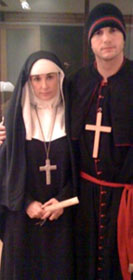 
Who is this mystery couple? And this
mystery schoolgirl? And
where are they headed? (Hint: to the same place)
 A team of British academics are
creating a virtual reality helmet called
Virtual Cocoon, which stimulates the senses so convincingly they've termed
it "real virtuality". The prototype helmet connects wirelessly to a
computer which feeds it information about a virtual world or another part of the
real world. It features a high-definition high dynamic screen which
produces pictures 10x darker, or 30x brighter than conventional tv. A tube
connecting to a box of chemicals releases smells under the wearer's nose while a
similar device can spray flavours directly into the mouth and provide texture
sensations. Heat and humidity can be changed using a fan and heater, while
surround-sound speakers recreate ambient noise - the first virtual reality
device to engage the 5 senses. Unfortunately, it won't be for sale for
another 5 years or so...
Can you read personality from a face? Baby-faced men are, on average,
better educated, more assertive and apt to win more military medals than their
mature-looking counterparts. They are also more likely to be criminals
(think Al Capone). Similarly, baby-faced boys can be quarrelsome and
hostile but are more likely to be academic high-fliers. And women's faces
disclose even more than men's do. Our personality moulds the way our faces
look. One study found that angry old people tend to look cross even when
asked to strike a neutral expression. A lifetime of scowling, grumpiness
and grimaces leaves its mark.
In another study participants examined news accounts of fictitious corporate
misdeeds. In minor public relations crises, participants held a more
favourable attitude toward a baby-faced CEO (large eyes, small nose, high
forehead, small chin) than a mature-faced CEO. Study subjects perceived
baby-faced CEOs as more honest. However, when the situation was serious -
especially when it involved questions of competency - a baby-faced
representative didn't help the company. In contexts where innocence
conveys naïveté, a mature face is evaluated more favourably. For example,
if a company fails to detect important defects in products, a baby-faced CEO is
perceived to be detrimental. A team of British academics are
creating a virtual reality helmet called
Virtual Cocoon, which stimulates the senses so convincingly they've termed
it "real virtuality". The prototype helmet connects wirelessly to a
computer which feeds it information about a virtual world or another part of the
real world. It features a high-definition high dynamic screen which
produces pictures 10x darker, or 30x brighter than conventional tv. A tube
connecting to a box of chemicals releases smells under the wearer's nose while a
similar device can spray flavours directly into the mouth and provide texture
sensations. Heat and humidity can be changed using a fan and heater, while
surround-sound speakers recreate ambient noise - the first virtual reality
device to engage the 5 senses. Unfortunately, it won't be for sale for
another 5 years or so...
Can you read personality from a face? Baby-faced men are, on average,
better educated, more assertive and apt to win more military medals than their
mature-looking counterparts. They are also more likely to be criminals
(think Al Capone). Similarly, baby-faced boys can be quarrelsome and
hostile but are more likely to be academic high-fliers. And women's faces
disclose even more than men's do. Our personality moulds the way our faces
look. One study found that angry old people tend to look cross even when
asked to strike a neutral expression. A lifetime of scowling, grumpiness
and grimaces leaves its mark.
In another study participants examined news accounts of fictitious corporate
misdeeds. In minor public relations crises, participants held a more
favourable attitude toward a baby-faced CEO (large eyes, small nose, high
forehead, small chin) than a mature-faced CEO. Study subjects perceived
baby-faced CEOs as more honest. However, when the situation was serious -
especially when it involved questions of competency - a baby-faced
representative didn't help the company. In contexts where innocence
conveys naïveté, a mature face is evaluated more favourably. For example,
if a company fails to detect important defects in products, a baby-faced CEO is
perceived to be detrimental.
 Shovel
or spade? According to Wikipedia, a spade is a "tool designed
primarily for the purpose of digging or removing earth." A shovel on the
other hand is a "tool for lifting and moving loose material." A spade "is
sometimes considered a type of shovel" and a spade's "typical shape is a broad
flat blade with a sharp lower edge" - at least on the page about spades.
The page about shovels says a spade "usually has a point and is designed to be
pushed into the soil with a foot. Spade blades usually have a rounded face
without sharply upturned sides." So does a spade have a broad flat blade,
or a point, a rounded face, and upturned sides? Personally, I had always
thought that a shovel is squared off (as in the photo to the right) while a
spade has a rounded point - though in Australia it appears you can call either
one by either name. (How's that for precision?)...
During melting markets, pension funds come under siege. If you’re
covered by a "defined contribution" plan, contributions are invested - usually
by your employer and usually in the stock market - and returns are credited to
the employee’s account. Your retirement savings grow if the market rises
or, as is the case now, bleed when it crashes. You carry the risk on your
shoulders. The risk shifts to the employer under "defined benefit" plans
in which future outlays are guaranteed. That seemed like a great idea for
business as recently as 2007, when the market was rising and pension funds of
America’s 500 largest companies held a surplus of $60 billion. Now they’re
at a deficit of $200 billion, with fund assets dropping like a lodestone.
The Pension Protection Act of 2006 requires companies to keep the accounts fully
funded, meaning they must have enough money to pay all retirees should everyone
decide to withdraw funds at once. Yet more than 200 of the 500 big-company
plans are nowhere close to meeting that standard and those dire numbers are
increasing. Companies with defined-benefit pensions may find themselves
choosing between making payroll or topping up pension plans; many businesses
therefore may freeze or even cut retiree benefits. These public and
union-based defined benefit plans cover 27 million people and represent more
than 30% of the $15 trillion dollars held in US retirement accounts. Shovel
or spade? According to Wikipedia, a spade is a "tool designed
primarily for the purpose of digging or removing earth." A shovel on the
other hand is a "tool for lifting and moving loose material." A spade "is
sometimes considered a type of shovel" and a spade's "typical shape is a broad
flat blade with a sharp lower edge" - at least on the page about spades.
The page about shovels says a spade "usually has a point and is designed to be
pushed into the soil with a foot. Spade blades usually have a rounded face
without sharply upturned sides." So does a spade have a broad flat blade,
or a point, a rounded face, and upturned sides? Personally, I had always
thought that a shovel is squared off (as in the photo to the right) while a
spade has a rounded point - though in Australia it appears you can call either
one by either name. (How's that for precision?)...
During melting markets, pension funds come under siege. If you’re
covered by a "defined contribution" plan, contributions are invested - usually
by your employer and usually in the stock market - and returns are credited to
the employee’s account. Your retirement savings grow if the market rises
or, as is the case now, bleed when it crashes. You carry the risk on your
shoulders. The risk shifts to the employer under "defined benefit" plans
in which future outlays are guaranteed. That seemed like a great idea for
business as recently as 2007, when the market was rising and pension funds of
America’s 500 largest companies held a surplus of $60 billion. Now they’re
at a deficit of $200 billion, with fund assets dropping like a lodestone.
The Pension Protection Act of 2006 requires companies to keep the accounts fully
funded, meaning they must have enough money to pay all retirees should everyone
decide to withdraw funds at once. Yet more than 200 of the 500 big-company
plans are nowhere close to meeting that standard and those dire numbers are
increasing. Companies with defined-benefit pensions may find themselves
choosing between making payroll or topping up pension plans; many businesses
therefore may freeze or even cut retiree benefits. These public and
union-based defined benefit plans cover 27 million people and represent more
than 30% of the $15 trillion dollars held in US retirement accounts.
 Electronic waste is a resource that's being managed poorly. Phones and
computers should be designed so recyclers can easily extract recyclable
materials from the discards. In Germany alone 24 million mobile phones are
thrown away each year, almost 1 for every 3 residents - but only 1 in 6 gets
dropped off at a recycling centre. Nevertheless, a Hamburg-based refiner,
one of a handful of precious-metal recycling firms in the world, recovers about
3.5 tons of gold worth some $110 million each year from mobile phones and other
electronic scrap. A firm in Belgium recovers 6 tons of gold a year from
waste. A metric ton of electronic waste contains as much as 347 grams
(11.16 troy ounces) of gold and electronic waste is growing 3x faster than
regular household garbage. This MUST be managed better since
60% of the world's population - more than 4.1 billion people - have mobiles.
In Africa, 28% of the population now have cellphones compared to just 2% in
2000. In fact, developing countries account for two-thirds of those in
use. (For comparison, only 23% of the world used the internet last year.)
Sweden is most advanced in using information and communications technology
followed by South Korea and Denmark. The UK is 10th ahead of the US,
France, Germany and Japan... Major General (Retired) Leonid Shershnev,
former head of Russia's military space intelligence, claims the collision
between US and Russian satellites in early February 2009 may have been a test of
new US technology to intercept and destroy satellites rather than an
accident as reported by the news. The 2 satellites collided 800 kilometres
(500 miles) above Siberia. The US military satellite involved was part of
the "dual-purpose" Orbital Express research project, a mission managed by the US
Defense Advanced Research Projects Agency (DARPA) meant "to validate the
technical feasibility of robotic, autonomous on-orbit refueling and
reconfiguration of satellites to support a broad range of future US national
security and commercial space programs." Shershnev claims the US military
is developing technology to allow inspection of orbital spacecraft by
fully-automated satellites equipped with robotic devices; he suggests the
collision indicates the US is now capable of manipulating "hostile satellites" -
including destroying them.
Electronic waste is a resource that's being managed poorly. Phones and
computers should be designed so recyclers can easily extract recyclable
materials from the discards. In Germany alone 24 million mobile phones are
thrown away each year, almost 1 for every 3 residents - but only 1 in 6 gets
dropped off at a recycling centre. Nevertheless, a Hamburg-based refiner,
one of a handful of precious-metal recycling firms in the world, recovers about
3.5 tons of gold worth some $110 million each year from mobile phones and other
electronic scrap. A firm in Belgium recovers 6 tons of gold a year from
waste. A metric ton of electronic waste contains as much as 347 grams
(11.16 troy ounces) of gold and electronic waste is growing 3x faster than
regular household garbage. This MUST be managed better since
60% of the world's population - more than 4.1 billion people - have mobiles.
In Africa, 28% of the population now have cellphones compared to just 2% in
2000. In fact, developing countries account for two-thirds of those in
use. (For comparison, only 23% of the world used the internet last year.)
Sweden is most advanced in using information and communications technology
followed by South Korea and Denmark. The UK is 10th ahead of the US,
France, Germany and Japan... Major General (Retired) Leonid Shershnev,
former head of Russia's military space intelligence, claims the collision
between US and Russian satellites in early February 2009 may have been a test of
new US technology to intercept and destroy satellites rather than an
accident as reported by the news. The 2 satellites collided 800 kilometres
(500 miles) above Siberia. The US military satellite involved was part of
the "dual-purpose" Orbital Express research project, a mission managed by the US
Defense Advanced Research Projects Agency (DARPA) meant "to validate the
technical feasibility of robotic, autonomous on-orbit refueling and
reconfiguration of satellites to support a broad range of future US national
security and commercial space programs." Shershnev claims the US military
is developing technology to allow inspection of orbital spacecraft by
fully-automated satellites equipped with robotic devices; he suggests the
collision indicates the US is now capable of manipulating "hostile satellites" -
including destroying them.
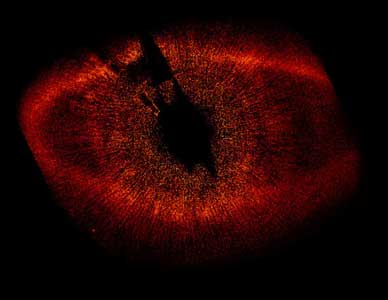 |
 |
|
A dust ring (seen in red in the image above) surrounds
the star
Fomalhaut. The star at the centre of the image is not visible to
the human eye. The Hubble telescope has discovered a fuzzy image of a
new planet, known as Fomalhaut b, appearing as a tiny white speck in the
dust ring surrounding the star. |
The
Veil Nebula (above) is composed of the remains of a star that exploded
5,000 years ago. |
 A
long-tailed macaque flosses her teeth in front of her baby. The
frequency of teeth-cleaning roughly doubles and becomes more elaborate when
infant monkeys watch, suggesting females deliberately teach their young how to
floss. What was unsaid was who taught the mother? Her mother?
A keeper? A search online turned up the fact that these macaques live in
temple ruins north of Bangkok.
They use human hairs, they apparently taught themselves, and they began
after they started eating crabs, which would get stuck in their teeth...
Patients should not expect to be prescribed antibiotics to cure coughs and
colds. In Britain alone, more than £100 million is wasted every year
on 23 million prescriptions for drugs to fight illnesses against which they have
no effect. Colds are caused by viruses, meaning antibiotics, which only
fight bacteria, are useless; common viral illnesses generally clear up on their
own. Using unnecessary antibiotics increases resistance to them and makes
it difficult to treat serious bacterial infections in the future. An
inexpensive test has been available for years for a substance in the blood
called CRP (C-Reactive Protein), which is raised with bacterial infections.
Its presence gives an indication whether antibiotics are needed. The test
is based on a fingertip drop of blood and takes only a couple of minutes.
The doctor can do it. While the CRP test is not specific enough to
diagnose a particular disease,
it serves as a general marker for infection and inflammation, thus alerting
medical professionals that further testing and treatment may be necessary.
Around ¼ of the population visits doctors each year for respiratory tract
infections. Far too many return home with antibiotics. A
long-tailed macaque flosses her teeth in front of her baby. The
frequency of teeth-cleaning roughly doubles and becomes more elaborate when
infant monkeys watch, suggesting females deliberately teach their young how to
floss. What was unsaid was who taught the mother? Her mother?
A keeper? A search online turned up the fact that these macaques live in
temple ruins north of Bangkok.
They use human hairs, they apparently taught themselves, and they began
after they started eating crabs, which would get stuck in their teeth...
Patients should not expect to be prescribed antibiotics to cure coughs and
colds. In Britain alone, more than £100 million is wasted every year
on 23 million prescriptions for drugs to fight illnesses against which they have
no effect. Colds are caused by viruses, meaning antibiotics, which only
fight bacteria, are useless; common viral illnesses generally clear up on their
own. Using unnecessary antibiotics increases resistance to them and makes
it difficult to treat serious bacterial infections in the future. An
inexpensive test has been available for years for a substance in the blood
called CRP (C-Reactive Protein), which is raised with bacterial infections.
Its presence gives an indication whether antibiotics are needed. The test
is based on a fingertip drop of blood and takes only a couple of minutes.
The doctor can do it. While the CRP test is not specific enough to
diagnose a particular disease,
it serves as a general marker for infection and inflammation, thus alerting
medical professionals that further testing and treatment may be necessary.
Around ¼ of the population visits doctors each year for respiratory tract
infections. Far too many return home with antibiotics.
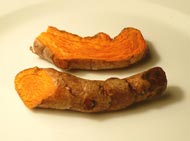 Revered in India as "holy powder,"
the marigold-coloured spice known as turmeric (commonly used in curries,
mustards, to colour cheeses, in sunscreens, and to deter ants) has been used for
centuries to treat wounds, infections and other health problems. Research
into the healing powers of turmeric's main ingredient, curcumin, has revealed an
astonishing array of antioxidant, anti-cancer, antibiotic, antiviral and other
properties. But how does it work? Curcumin
acts as a disciplinarian, inserting itself into cell membranes and making them
more orderly, a move that improves cells' resistance to infection and
malignancy. Turmeric is a member of the ginger family...
How important is commitment? In an experiment, students given a short
course in taking black and white photos were taught how to develop their
pictures in the darkroom. Half were told that they could pick one of their
pictures to be professionally enlarged and developed, which they could then
keep. The other half were told to pick 2 pictures to keep and advised they
should wait until the last minute to make a final decision. The latter
group had a continual temptation to change choices; they considered and
reconsidered which of their prints were best. Later, participants were
asked to rate their level of happiness with their prints. Who was happier
- those who early on chose a photo and stuck with it or those who had
flexibility and time to make perfect selections? As it turns out, people
who could alter their choices were much less happy. The principle behind
this: when we have to deal with a fixed reality, we can get used to it and even
come to prefer it. But if we think we can change things, we don’t force
ourselves to cope. Inevitable imperfections — whether in people or in
pictures — can drive us to distraction. The same thing happens with
marriage. If we think of marriage as an open market and always have an
eye on other options, we are less likely to be happy and much more likely to
divorce. Revered in India as "holy powder,"
the marigold-coloured spice known as turmeric (commonly used in curries,
mustards, to colour cheeses, in sunscreens, and to deter ants) has been used for
centuries to treat wounds, infections and other health problems. Research
into the healing powers of turmeric's main ingredient, curcumin, has revealed an
astonishing array of antioxidant, anti-cancer, antibiotic, antiviral and other
properties. But how does it work? Curcumin
acts as a disciplinarian, inserting itself into cell membranes and making them
more orderly, a move that improves cells' resistance to infection and
malignancy. Turmeric is a member of the ginger family...
How important is commitment? In an experiment, students given a short
course in taking black and white photos were taught how to develop their
pictures in the darkroom. Half were told that they could pick one of their
pictures to be professionally enlarged and developed, which they could then
keep. The other half were told to pick 2 pictures to keep and advised they
should wait until the last minute to make a final decision. The latter
group had a continual temptation to change choices; they considered and
reconsidered which of their prints were best. Later, participants were
asked to rate their level of happiness with their prints. Who was happier
- those who early on chose a photo and stuck with it or those who had
flexibility and time to make perfect selections? As it turns out, people
who could alter their choices were much less happy. The principle behind
this: when we have to deal with a fixed reality, we can get used to it and even
come to prefer it. But if we think we can change things, we don’t force
ourselves to cope. Inevitable imperfections — whether in people or in
pictures — can drive us to distraction. The same thing happens with
marriage. If we think of marriage as an open market and always have an
eye on other options, we are less likely to be happy and much more likely to
divorce.
 Acqua
Liana (meaning "water flower") is property developer and author Frank
McKinney's new £15 million ecological mansion in Manalapan, Florida. At
left is his arched aquarium/wet bar (which may be the nicest aquarium I've
seen). I would love to own something like that, except that it must be a
nightmare to keep clean. Presumably he has servants - but I'm not sure how
they
could manage. Someone who always wanted an aquarium but never had one may
not realise the effort involved in keeping algal growth under control. I
predict that it isn't still around in 5 years - he should get all the pleasure
from it he can before it begins to look scruffy. Perhaps he doesn't intend
to actually put live fish in - I don't see any in the photo. That
would certainly help - but one wonders why, then, he'd go to the trouble of
having it built in the first place... A curious photo of
a whale and one of
a castle in Scotland that looks to be straight out of a fairy tale. Acqua
Liana (meaning "water flower") is property developer and author Frank
McKinney's new £15 million ecological mansion in Manalapan, Florida. At
left is his arched aquarium/wet bar (which may be the nicest aquarium I've
seen). I would love to own something like that, except that it must be a
nightmare to keep clean. Presumably he has servants - but I'm not sure how
they
could manage. Someone who always wanted an aquarium but never had one may
not realise the effort involved in keeping algal growth under control. I
predict that it isn't still around in 5 years - he should get all the pleasure
from it he can before it begins to look scruffy. Perhaps he doesn't intend
to actually put live fish in - I don't see any in the photo. That
would certainly help - but one wonders why, then, he'd go to the trouble of
having it built in the first place... A curious photo of
a whale and one of
a castle in Scotland that looks to be straight out of a fairy tale.
One last note: I'll be visiting New York City for the next 3 weeks.
I'll try to post from there, but if that doesn't work, I may be a week or so
late with the next upload.
The most beautiful experience we can have is the mysterious.
It is the fundamental emotion which stands at the cradle of true art and true
science.
Whosoever does not know it and can no longer wonder, no longer marvel, is as
good as dead, and his eyes are dimmed.
- Albert Einstein

For other updates click "Back" (for newer) or "Next" (for older) below
|
 Animals
Animals Animation
Animation Art of Playing Cards
Art of Playing Cards Drugs
Drugs Education
Education Environment
Environment Flying
Flying History
History Humour
Humour Immigration
Immigration Info/Tech
Info/Tech Intellectual/Entertaining
Intellectual/Entertaining Lifestyles
Lifestyles Men
Men Money/Politics/Law
Money/Politics/Law New Jersey
New Jersey Odds and Oddities
Odds and Oddities Older & Under
Older & Under Photography
Photography Prisons
Prisons Relationships
Relationships Science
Science Social/Cultural
Social/Cultural Terrorism
Terrorism Wellington
Wellington Working
Working Zero Return Investment
Zero Return Investment


























